Psalm, 31 has much in common with other parts of scripture. Phrases appear here that are also found in other psalms, in Jonah, Jeremiah, Lamentations, and in Luke.
Trust
1-8 In you, O Lord, do I take refuge; let me never be put to shame; in your righteousness deliver me! 2 Incline your ear to me; rescue me speedily! Be a rock of refuge for me, a strong fortress to save me! 3 For you are my rock and my fortress; and for your name’s sake you lead me and guide me; 4 you take me out of the net they have hidden for me, for you are my refuge. 5 Into your hand I commit my spirit; you have redeemed me, O Lord, faithful God. 6 I hate those who pay regard to worthless idols, but I trust in the Lord. 7 I will rejoice and be glad in your steadfast love, because you have seen my affliction; you have known the distress of my soul, 8 and you have not delivered me into the hand of the enemy; you have set my feet in a broad place.
The main theme of this psalm is trust in the deliverance and fellowship of God. This first section sets forth the theme mostly in terms of deliverance from enemies. There seem to be two primary reasons why God has delivered.






First, God has delivered because of who he is — “in your righteousness” (1), “for your name’s sake” (3).
Second, he has delivered because he is aware — “you have seen my affliction and you have known the distress of my soul” (7). Even a righteous and loving God would be of little help if he were not also omniscient. Later it will be clear that the writer has experienced a sense of being abandoned. But, at the point of writing, he is now aware of the fact that God sees and knows.
Problems
9-13 Be gracious to me, O Lord, for I am in distress; my eye is wasted from grief; my soul and my body also. 10 For my life is spent with sorrow, and my years with sighing; my strength fails because of my iniquity, and my bones waste away. 11 Because of all my adversaries I have become a reproach, especially to my neighbours, and an object of dread to my acquaintances; those who see me in the street flee from me. 12 I have been forgotten like one who is dead; I have become like a broken vessel. 13 For I hear the whispering of many— terror on every side!— as they scheme together against me, as they plot to take my life.
Two kinds of problems have come upon the writer. Some kind of physical or spiritual weakness has troubled him (9-10). The admitted cause is his own sin (10) [the NIV obscures this by following a version (affliction) instead of Hebrew text (iniquity)]. Second, his troubles are compounded by the treatment given by others (11-13).
Trust
14-16 But I trust in you, O Lord; I say, “You are my God.” 15 My times are in your hand; rescue me from the hand of my enemies and from my persecutors! 16 Make your face shine on your servant; save me in your steadfast love!
The main theme of trust in the deliverance of God is repeated. Once again, the basis for the appeal for deliverance is within God himself, this time in his “steadfast love” (16).
Request
17-18 O Lord, let me not be put to shame, for I call upon you; let the wicked be put to shame; let them go silently to Sheol. 18 Let the lying lips be mute, which speak insolently against the righteous in pride and contempt.
The request of this Psalm is for personal deliverance and punishment of those doing wrong.
Praise
19-24 Oh, how abundant is your goodness, which you have stored up for those who fear you and worked for those who take refuge in you, in the sight of the children of mankind! 20 In the cover of your presence you hide them from the plots of men; you store them in your shelter from the strife of tongues. 21 Blessed be the Lord, for he has wondrously shown his steadfast love to me when I was in a besieged city. 2 I had said in my alarm, “I am cut off from your sight.” But you heard the voice of my pleas for mercy when I cried to you for help. 23 Love the Lord, all you his saints! The Lord preserves the faithful but abundantly repays the one who acts in pride. 23 Love the Lord, all you his saints! The Lord preserves the faithful but abundantly repays the one who acts in pride.
24 Be strong, and let your heart take courage, all you who wait for the Lord!
Toward the end, the psalmist turns to praise, and his final word is a call to others to join him in trusting and praising the Lord.
This is a wonderful psalm with much comfort. It is a fine model for our prayers, and an example of the value of adversity in driving us to God.
From the New Testament perspective, we must say one additional word. The psalmist commits his spirit to God in seeking deliverance from death (5). Jesus used these very words (Lk 23:46), but he was not seeking deliverance from death. This should strengthen our appreciation for what Jesus did.
The psalm calls on us to examine how we face life, how we face death, and how we view God. Do we trust him enough to say “into your hand I commit my spirit”?

